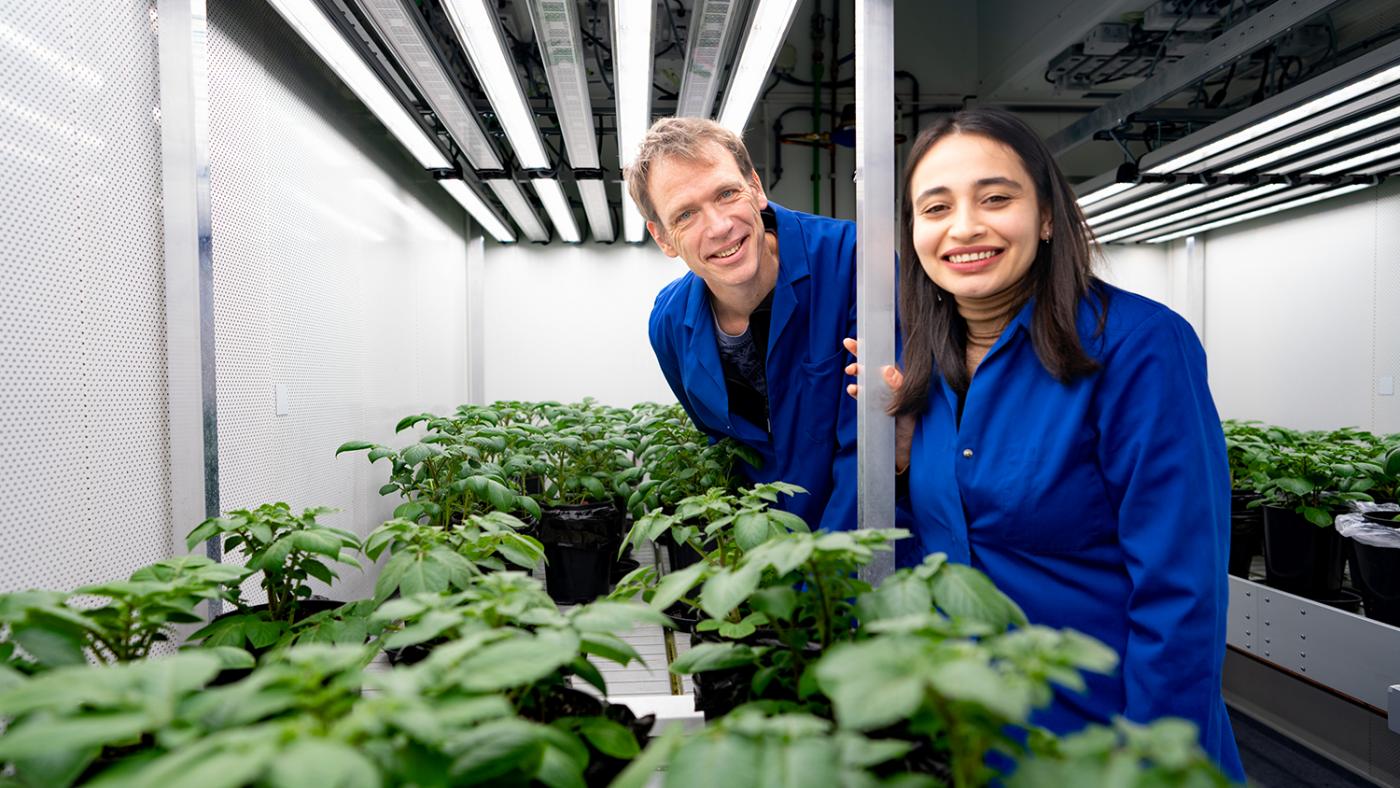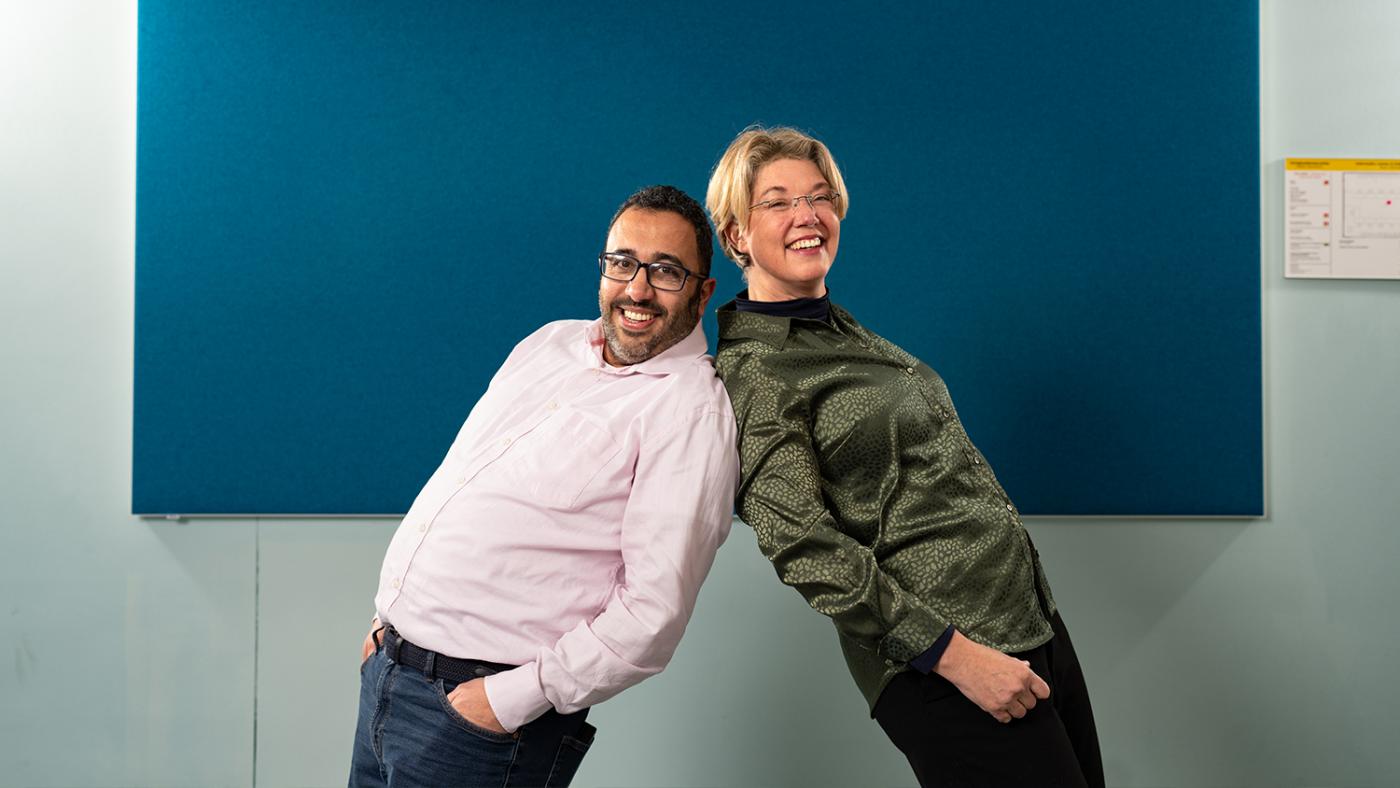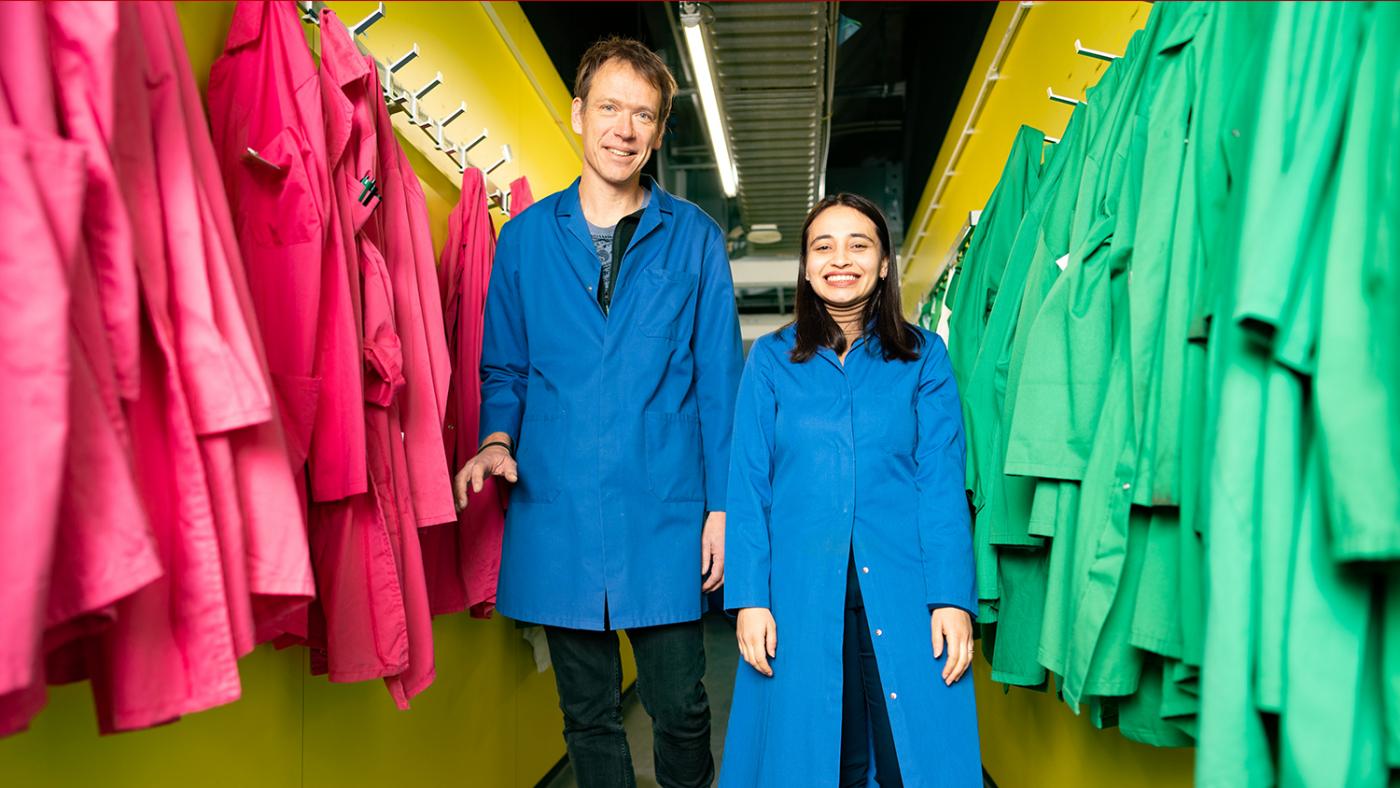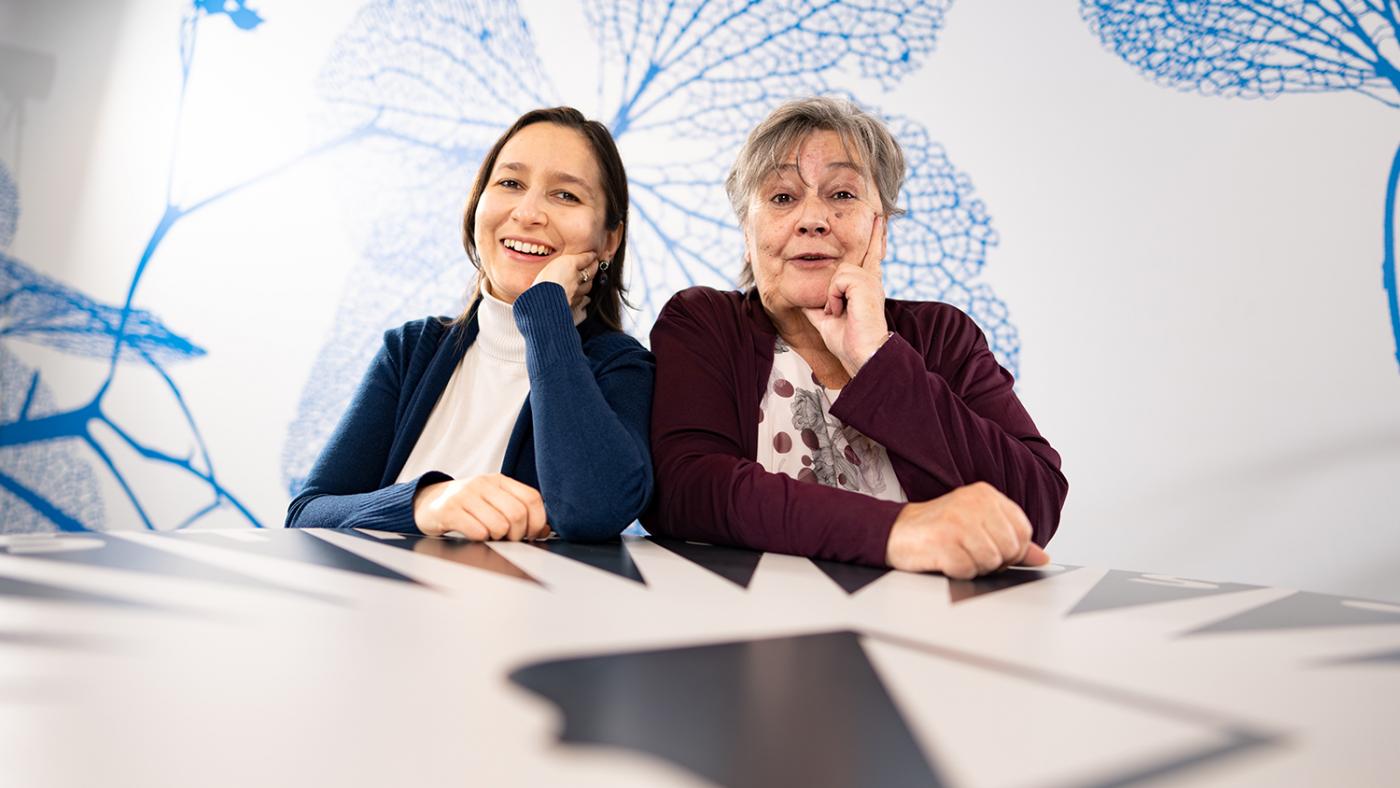Refugees work as trainees at UU
‘It’s not just about having a new job. It’s about having a new life’

“Almost 60 percent of all refugees still don’t have a job five years after receiving their status. When they do, it’s often a menial job, even if they have a higher education degree,” says Incluusion’s Project Manager Ragna Senf. Hence the decision, taken in 2020, to expand the programme, not only allowing refugees and asylum seekers to follow courses at UU, but also providing those with refugee status with work experience within the university.
The traineeship is aimed at refugees with a background in higher education or work experience at a university. A higher education degree is not required – after all, sometimes refugees cannot show their diploma because they couldn’t take it with them when fleeing and there are no digital copies. In other cases, candidates may have climbed the career ladder at a university without a Bachelor’s diploma, to begin with.
The placement lasts six to eight months and the trainee can be allocated to a certain department at a faculty or central level. The university itself offers no financial compensation, so the trainee can retain the benefits from the Dutch government. In addition to work experience, UU offers them Dutch private lessons, a workshop on Intercultural Awareness and a professional development budget.
In 2022, eleven trainees started a traineeship at UU. Eight of the nine that are already finished found a job within or outside of UU. In the summer, 80 people replied to the latest call for applications, of whom ten candidates will soon be selected and matched with suitable workplaces across the university, according to their academic background and experience.
DUB talked to three trainees turned UU employees: Elias Abou Chaaya, Tuğba Akyüz and Elif Hotalak. They were interviewed alongside their respective managers.

Photo: Ivar Pel
Elias Abou Chaaya, Event Coordinator at the Equality, Diversity & Inclusion Office and his manager Brigitte Prieshof
Chaaya comes from Lebanon and has been working at the EDI Office for almost a year. He joined the EDI Office in February as a trainee and now works there on a 20-hour contract valid until the end of 2024. He’s responsible for organising events like Canal Pride and the two Diversity Months UU holds in March and October.
Applicants to the Incluusion traineeship can indicate their preferences and are placed based on a match between their skill set and available workplaces. Chaaya is thrilled to have got his first choice. “EDI is trying to give a voice to people who don’t usually have it. Personally, I left Lebanon because I wasn’t given this right, so I really wanted to help other people,” he says.
He first heard about Incluusion while living in a refugee camp. “That was a very difficult part of the asylum process for me. I just wanted to leave the camp in any way possible. That’s when a friend of mine told me about the programme,” he recollects. He then applied to a course at UU. Attending it was no easy feat as he found the university quite demanding but, at the same time, he believes that all the readings and group projects contributed to pushing him out of a tough psychological place.
At the end of the course, Chaaya was considering applying for a new one when the programme’s coordinators suggested he apply for a traineeship instead. At first, he has hesitant. “I was still in the middle of the asylum process and I didn’t know if I would have the time. But then I learned about the existence of the EDI Office and that there was a chance the traineeship might be in that department.”
This is the first time an Incluusion trainee works at the EDI Office. Prieshof says the two of them clicked instantly. They agreed to speak Dutch so that Elias could improve his skills in the language but that turned out to be challenging because he wouldn’t always catch the nuances of what was said. “That’s when we decided to switch back to English whenever the subject matter is related to the work itself.” Informal conversations are still held in Dutch, though. Thanks to this arrangement, Chaaya says his language comprehension has improved greatly, and Prieshof thinks her English skills are improving, too. “I just came back from London and I was surprised at how much my vocabulary has expanded.”
When the traineeship period was approaching its final days, Prieshof thought it would be a shame to let Chaaya go. “We just couldn’t imagine the team without him anymore.” There was a part-time vacancy for the role of Event Coordinator which was unfilled, so it didn’t take long for the suggestion to arise: what if Elias would do it? “It was a win-win situation: he would burn some energy and we would fill our vacancy with someone who was not only excited about our work but also had the right knowledge and experience,” she says.
Her remark about burning energy is not an accident: Chaaya is the kind of person who loves to be a busy bee. Today, in addition to his job at the EDI Office, he’s following a Master’s in International Development Studies and an Honours programme. “This is who I am. This is how I always was in Lebanon. I like to come home at 11:00 pm knowing I have a full schedule the next day. Then I came here, applied for asylum and everything changed. I wasn’t able to work or study for two years. Even though moving to the Netherlands meant I was finally able to be openly gay, I lost that other part of me. That’s why I love Incluusion and the EDI Office so much: they gave it back to me.”
For now, Chaaya hopes to make an impact with the events he organises and, in the distant future, he would like to work for an NGO helping refugees just like himself. “But if there’s one thing I’ve learned in Lebanon is that you can’t plan for the future. We’ll see.”

Photo: Ivar Pel
Tuğba Akyüz, Research and Education Assistant in Environmental Biology and her manager Ronald Pierik
Akyüz’s trajectory is a little bit different than most Incluusion trainees in that she didn’t apply to the programme. Instead, she wrote an e-mail to Pierik directly, saying she really wanted to work with him. It was the professor who got in touch with Incluusion, asking them to take her in. “It was the first time I’d received an e-mail from someone who is in the country as a refugee, looking to gain experience and build a network in science. Her expertise fits perfectly with what we do,” he recalls.
Akyüz came from Turkey to the Netherlands about 1,5 years ago with her husband and child. She has a Master’s degree in Molecular Biology and was a PhD student in Turkey for six years, when she acquired a strong expertise in protein chemistry, but she wasn’t able to finish her track. She’s been working as a lab technician at UU for almost a year now. She started out as a trainee three days a week and, since September, she’s been a full-time employee.
“I was so happy when I got a positive response,” says Akyüz. Especially because she didn’t expect to get one at all. “In Turkey, if you send an e-mail to a professor, they usually don’t reply.” Pierik wasn’t the only one she’d approached in the Netherlands but he was the only one who gave her a chance. “I saw the light in the Netherlands when he made me an offer. It was tough here at first. I didn’t know the culture, I lacked a lot of information, and I was just trying to adapt here. I really wanted to work as a researcher back in Turkey and then I got it!”
As a trainee, she started out helping everyone who needed an extra pair of hands in the lab. “A postdoc was wrapping up, so we could use some help,” remembers Pierik, adding that Akyüz always expressed a wish to learn new techniques. “We motivated her to do that as well because it would make it more likely that she’d find a job in the future.” That job, however, turned out to be at UU itself. “I still had a Vici grant and I had a position open for a technician, so I asked her if she’d be interested in doing that for a year.” Like Elias, Akyüz finds that language is the hardest part of being an Incluusion trainee. “It’s Turkey, it’s not usual for people to speak English. We train a lot in reading and listening, but speaking, not so much. I’m trying to improve my skills and learn Dutch as well.” Pierik admits that language can be a struggle but notes that the issue is not unique to her. “We have people from all over the world in our team. Misunderstandings may arise not only because of language but also due to differing backgrounds. Sometimes you wonder: ‘has this person learned what I assume they have learned?’ That’s something we’re already used to.”
Although the team is very diverse, Pierik finds that Akyüz’s refugee status has been enriching for everyone as “most of us had never worked with someone who’s basically abandoned their whole life to start a new one. And the fact that she got her residence permit so quickly proves she had very good reasons to do so. This realisation is quite impactful for many people: we are so privileged, there are so many things we’d never even considered or imagined.”
He adds that he’s impressed with how hardworking she is – after all, she’s learning new things all the time, not just at the lab but in her spare time as well. “For Akyüz, it’s not just about having a new job. It’s about having a new life. Every aspect of her life is a learning process.”
As for the future, Akyüz would really like to get a PhD. Preferably in Turkey, as she was practically done with her track there. If that doesn’t work out, she doesn’t rule out a PhD in Utrecht, even though that would mean starting everything all over again.

Photo: Ivar Pel
Elif Hotalak, Administrative Assistant at the International Service Desk, and her manager Anita Leuverink
Hotalak also comes from Turkey. She has been living in the Netherlands since 2018. She studied Law in Turkey and obtained her Master’s in European Union Law in London. Since September, she’s employed at the International Service Desk (ISD), where she assists with visa procedures for UU employees. The contract followed a traineeship of eight months.
Her main goal when applying to the Incluusion programme was to improve her speaking skills in Dutch after two years of studying the language. “Me and my husband applied to all kinds of volunteer work but most companies only want people who have no trouble with the Dutch language. It was really hard to find something.” The first volunteering position she found was at a thrift shop but she kept looking for something more suitable for her level. That’s when she heard about Incluusion.
It looks like Hotalak’s mission is being accomplished as the interview with DUB is conducted entirely in Dutch. “When I started the traineeship, I had a B1 level and now I just passed the Staatsexamen (the official Dutch proficiency exam from the Dutch government, Ed.) at B2 level,” she says with a smile. Her manager, Anita Leuverink, confirms she has improved a lot but stresses that Hotalak was already quite good when she joined the team. “I was surprised that, when I dictated things to her, she would write every word correctly, without a single mistake.”
According to the manager, her listening skills were good too. However, she didn’t understand everything, especially during meetings or informal conversations, when people tend to talk over each other. But she’s got better at that as well. “She is very smart and a fast learner. She dares making mistakes, which is really important”.
Leuverink says Hotalak had an “instant click” with the rest of the team, so hiring her at the end of her traineeship was a no-brainer. “She’s a great addition to our team.” She has a one-year contract now and, if all goes well, the ISD intends to give her a permanent one.
“I understand why companies are hesitant to hire refugees who don’t master the Dutch language. It takes effort to hire such a person. So, what UU does through the Incluusion traineeship programme means a lot. UU doesn’t have to do that but it does anyway. That’s really valuable,” concludes Hotalak.